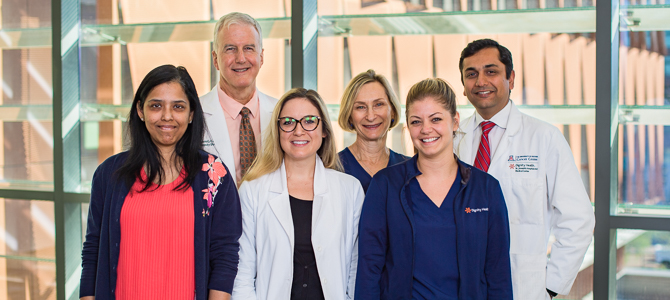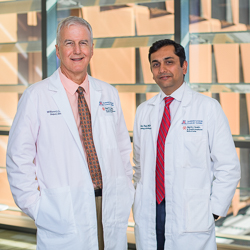
First Ever Clinical Trial to Treat Liver Cancer Through Immunotherapy

A novel approach to treat liver cancer using the body’s own immune system is now in clinical trials at the University of Arizona Cancer Center at Dignity Health St. Joseph’s Hospital and Medical Center. This will be the first time immunotherapy has been used as a primary treatment option for liver cancer.
In the United States, an estimated 33,000 people are diagnosed with liver cancer each year, and about 26,000 people die from the disease. According to the Centers for Disease Control and Prevention, the percentage of Americans diagnosed with liver cancer has been rising steadily for several decades.
“Liver cancer is a major problem here in Arizona, and the treatment options are very limited,” said William Cance, MD, deputy director of the UA Cancer Center at Dignity Health St. Joseph’s Hospital and Medical Center. “It’s an aggressive disease with very few treatment options. Because of this, many Americans with liver cancer receive no treatment at all.”

“Historically, it has been difficult to find effective and safe options for treatment of this cancer, since most patients also are ailing with irreversible liver damage from cirrhosis or viral hepatitis. This trial evaluates a relatively well-tolerated treatment option in the first-line setting for advanced liver cancers with some significant response data in early studies,” Dr. Patel said. “Immunotherapy has been changing treatment paradigms in many cancers. We hope to achieve the same with liver cancer with this trial.”
The trial is accepting 480 patients worldwide, who will be randomized to receive Atezolizumab (PDL-1 inhibitor) in combination with Bevacizumab (anti-angiogenesis antibody) or Sorafenib, a multi-kinase inhibitor that is FDA approved to treat liver cancer.
“Bringing immunotherapy to liver cancer treatment with a combination of another biologically targeted agent never has been done before,” Dr. Cance said. “We hope this option drastically improves the lives of patients suffering with this aggressive disease and gives them hope.”
Initial phases of the study found that a combination of Atezolizumab with Bevacizumab received a 61 percent response rate (14 out of 23 participants responded positively to the treatment). Experts hope this will treat the cancer by activating the immune system and amplifying an immune response.
The clinical trial is being sponsored by Genentech, a biotechnology company that develops, manufactures and commercializes medicines to treat patients with serious or life-threatening medical conditions. Genentech manufactures both drugs and is paying for the trial.
The study has representation from 17 nations, which hopefully will provide experts information regarding how people in different parts of the world develop liver cancer.
Immunotherapy has been approved as a second-line treatment for liver cancer; in this trial, it will be first-line for advanced and metastatic liver cancer. Dr. Cance said this is a treatment option these patients never have had.
“The patients in these clinical trials are the true heroes,” Dr. Cance said. “This is the first of many steps to find a cure for liver cancer, and we cannot do it without the support and help of our community.”
Topics
About the College
Founded in 2007, the University of Arizona College of Medicine – Phoenix inspires and trains exemplary physicians, scientists and leaders to advance its core missions in education, research, clinical care and service to communities across Arizona. The college’s strength lies in our collaborations and partnerships with clinical affiliates, community organizations and industry sponsors. With our primary affiliate, Banner Health, we are recognized as the premier academic medical center in Phoenix. As an anchor institution of the Phoenix Bioscience Core, the college is home to signature research programs in neurosciences, cardiopulmonary diseases, immunology, informatics and metabolism. These focus areas uniquely position us to drive biomedical research and bolster economic development in the region.
As an urban institution with strong roots in rural and tribal health, the college has graduated more than 1,000 physicians and matriculates 130 students each year. Greater than 60% of matriculating students are from Arizona and many continue training at our GME sponsored residency programs, ultimately pursuing local academic and community-based opportunities. While our traditional four-year program continues to thrive, we will launch our recently approved accelerated three-year medical student curriculum with exclusive focus on primary care. This program is designed to further enhance workforce retention needs across Arizona.
The college has embarked on our strategic plan for 2025 to 2030. Learn more.